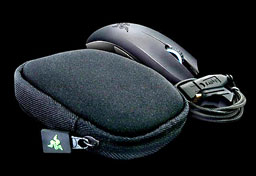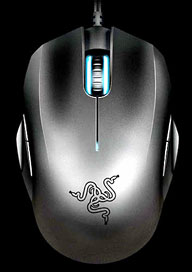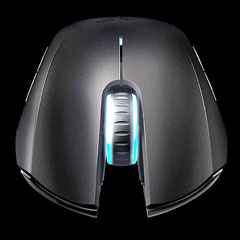'Book Value
Razer Orochi: One of the Nicest Mice I've Ever Used
Charles Moore - 2009.11.03 - Tip Jar
Rating: 
Nearly two months now on with wireless broadband, after 13 years of really slow dialup, the speed is still a novelty. The service has been faultlessly dependable so far, with no outages or other problems with the network. We'll see how things go in a Nova Scotia winter's snows and ice storms.
Pismo WiFi Problems
The only problematical aspect has been not with the network or the Belkin wireless router, but rather with increasingly erratic and ragged performance when connected with my old Pismo PowerBook via a Buffalo WiFi CardBus adapter and AirPort running under Mac OS X 10.4.11. For the first couple of weeks back in September, this setup worked well, but currently it's gotten so bad as to be unusable. The connection just drops out for no apparent reason, sometimes spontaneously restoring itself - but usually not.
Dialup (I've maintained a minimal dialup service) still works as well as it ever has, but the wireless LAN, which works superbly with my Unibody MacBook and 17" PowerBook G4, is a washout with the Pismo so far.
I've tried the usual easy stuff like running system maintenance routines with OnyX, and even applied the OS X 10.4.11 Combo installer again, but no joy. I suppose a clean system reinstall would be worth a shot, and I may try that next experimentally on an external FireWire drive, but I've been ultra busy lately and haven't been able to fit it in.
17" PowerBook
I prefer using the Pismo for drafting and editing away from my office workstation, but the wireless connectivity problem has me stymied, so the alternative for now is to use the big 17-incher. That has other advantages, such as support for OS X 10.5 "Leopard", but as I've related here previously, I absolutely detest the AlBook's trackpad - and it doesn't seem to like me much either. It's too bad, because otherwise the 1.33 GHz G4 unit is a pleasure to use (albeit a bit heavy).
One workaround I tried was a Logitech Cordless TrackMan Wheel thumb-actuated trackball, the rationale being that a trackball made sense for this sort of service, in conjunction with a Laptop LaidBack stand on beds and couches, because it could remain stationary and didn't require a mousing surface. It did work pretty well, but I never really acclimatized to the thumb trackball to the point where it became intuitive.
A Great Mouse
 The Orochi is a very satisfying rodent to use. It's also
spectacular-looking, in a Darth Vader-ish way.
The Orochi is a very satisfying rodent to use. It's also
spectacular-looking, in a Darth Vader-ish way.
The Orochi, which is designed specifically for use with laptops and comes with a protective carry-case, although it would make a fine desktop mouse as well, is an ambidextrous unit that supports both Bluetooth wireless or hard-wired USB connectivity - the latter via the best-looking and most elegant USB cable I've ever seen: lightweight, extremely flexible, and covered with a black braided fabric-like texture. It plugs into a port at the mouse end hidden below the scroll wheel - gold-plated no less - and is a generous three feet in length.
 This multimode flexibility is a great idea. For use in desktop
mode, I would generally lean toward wired mode, but for portable use,
wireless is very convenient, and happily the Razer Orochi mouse has
manifested none of the latency lag that afflicts some Bluetooth mice.
Indeed, it is extremely responsive, thanks presumably to its
high-resolution 4000 dpi 3G laser sensor (five times greater than of
standard 800 dpi optical sensors) that offers speedy tracking up to 100
inches per second. That drops to 2000 dpi sensitivity when used with a
Bluetooth connection, and Razer says in order for the mouse to deliver
gaming grade precision, control, and accuracy, you want to go with a
hard-wired connection, although it's the most precise-feeling Bluetooth
mouse I've ever used.
This multimode flexibility is a great idea. For use in desktop
mode, I would generally lean toward wired mode, but for portable use,
wireless is very convenient, and happily the Razer Orochi mouse has
manifested none of the latency lag that afflicts some Bluetooth mice.
Indeed, it is extremely responsive, thanks presumably to its
high-resolution 4000 dpi 3G laser sensor (five times greater than of
standard 800 dpi optical sensors) that offers speedy tracking up to 100
inches per second. That drops to 2000 dpi sensitivity when used with a
Bluetooth connection, and Razer says in order for the mouse to deliver
gaming grade precision, control, and accuracy, you want to go with a
hard-wired connection, although it's the most precise-feeling Bluetooth
mouse I've ever used.
It also still takes several seconds to reconnect after the PowerBook has been wakened from sleep mode, which I find tedious, as Razer recommends switching the mouse off when not in use to extend battery life, which requires a short wait for reconnection, but otherwise it works extremely well.
 It's not a super-light mouse, being as it carries two AA cells
when used in Bluetooth mode, but it's definitely not heavy, weighing in
at 21 grams less on my postage scale than my slightly physically
smaller
Logitech V550 wireless laptop mouse, which also carries two AA
batteries. Few, if any, mice I've ever used track more effortlessly
than the Orochi, and it's It's a nice size (smaller than some of
Razer's other gaming mice, but not a mini-mouse by any means), has a
comfortable feel and good positive yet light button action. My only
real criticism is that the detents on the scroll wheel are too
pronounced and there's no freewheel option for the wheel.
It's not a super-light mouse, being as it carries two AA cells
when used in Bluetooth mode, but it's definitely not heavy, weighing in
at 21 grams less on my postage scale than my slightly physically
smaller
Logitech V550 wireless laptop mouse, which also carries two AA
batteries. Few, if any, mice I've ever used track more effortlessly
than the Orochi, and it's It's a nice size (smaller than some of
Razer's other gaming mice, but not a mini-mouse by any means), has a
comfortable feel and good positive yet light button action. My only
real criticism is that the detents on the scroll wheel are too
pronounced and there's no freewheel option for the wheel.
That latter issue had me pondering giving the Orochi Mouse a 3.75 out of 4 rating, but I'm so pleased with how this mouse has addressed my pointing input problem with the 17" PowerBook that I'm going to give it a full 4 out of 4. It's really a pleasure to use.
The Razer Orochi mouse requires Mac OS X 10.4 and later or Windows XP and later. It retails for $79.99, which is at the high end for computer mice these days, but this is a very high-quality, advanced engineering mouse. In general, even though I'm not a gamer myself, I often find gaming gear the cream of the crop for general use as well.
Purchase Link
- Razer Orochi Bluetooth Laser Gaming Mouse, currently $68.51 shipped at Amazon.com
Join us on Facebook, follow us on Twitter or Google+, or subscribe to our RSS news feed
Charles Moore has been a freelance journalist since 1987 and began writing for Mac websites in May 1998. His The Road Warrior column was a regular feature on MacOpinion, he is news editor at Applelinks.com and a columnist at MacPrices.net. If you find his articles helpful, please consider making a donation to his tip jar.
Links for the Day
- Mac of the Day: Power Mac 9500, introduced 1995.05.01. The first PCI Power Mac has 6 expansion slots, speeds of 120 and 132 MHz.
- Support Low End Mac
Recent Content
About LEM Support Usage Privacy Contact
Follow Low End Mac on Twitter
Join Low End Mac on Facebook
Favorite Sites
MacSurfer
Cult of Mac
Shrine of Apple
MacInTouch
MyAppleMenu
InfoMac
The Mac Observer
Accelerate Your Mac
RetroMacCast
The Vintage Mac Museum
Deal Brothers
DealMac
Mac2Sell
Mac Driver Museum
JAG's House
System 6 Heaven
System 7 Today
the pickle's Low-End Mac FAQ
Affiliates
Amazon.com
The iTunes Store
PC Connection Express
Macgo Blu-ray Player
Parallels Desktop for Mac
eBay

